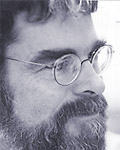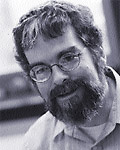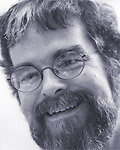|
|
Brother Guy Consolmagno: “Science will make you see your faith
in a deeper way.” Catholic New World photos by David V. Kamba
Brother astronomer: uniting science with faith
The Interview, a regular feature of The Catholic New World, is an in-depth conversation
with a person whose words, actions or ideas affect today’s Catholic.
It may be affirming of faith or confrontational. But it will always
be stimulating.
This week, Catholic New World staff writer Michelle Martin talks
with Jesuit Brother Guy Consolmagno.
Jesuit Brother Guy Consolmagno, 48, once wanted to be a journalist,
but he ended up an astronomer instead. “Journalism was much too
hard, so I decided to go into astrophysics,” Consolmagno said.
He had already launched his career as an astronomer studying meteorites
before being called to religious life 12 years ago. Now he is
the curator of meteorites at the Vatican Astronomical Observatory
in Arizona, and writes and lectures about the relationship between
religion and science. His book, “Brother Astronomer: Adventures
of a Vatican Scientist,” was recently released in paperback by
McGraw-Hill Higher Education.
The Catholic New World: How did you come to be an astronomer?
Brother Guy Consolmagno: My dad was a PR man, a journalist and a writer. But I was a Sputnik
kid. I started school the same year Sputnik went up, and naturally
I have this great love of science. Then I went to a Jesuit high
school, and they pointed out to me, quite rightly, that even if
you’re going to be a scientist, you should learn other things
as well—Latin, Greek, writing, history. By the end of that time,
I was so in love with writing and wanting to find out, I was torn
between wanting to be a journalist and wanting to be a Jesuit.
…
When I was at Boston College as a freshman, I was going through
the typical freshman crises and decided I should become a Jesuit.
A Jesuit priest I talked to said, “Well, have you prayed about
this?” So I went to my room, closed the door, and asked God, “Is
this what you want me to do?” And there was nothing. I was feeling
very, very foolish. And while I was sitting there feeling foolish,
it suddenly occurred to me, “What does a priest actually do?”
Well, he deals with people, people with problems, just like all
the guys in my dorm I couldn’t stand. Maybe this was a dumb thing
to do.
At the same time, my best friend from high school was at MIT,
and it was just such a cool place to be. And it suddenly hit me—that’s
where I belonged. It turns out this is great Jesuit spirituality,
but I didn’t know that at the time. God is trying to tell you
what to do by the things that you enjoy, the things you don’t
enjoy, the things that give you a deep lasting sense of contentment.
I got that at MIT, so I transferred. I had one course in meteorites
that was such a great course, it would make the whole day for
me, which is basically how I wound up being in the field.
It wasn’t until 20 years later that I felt the call again to be
a Jesuit, and then it was to be a brother, not a priest. But,
again, it was a call. It wasn’t something that I thought up ahead
of time, and it wasn’t anything I particularly planned.
TCNW: Have you found any conflict between religious and scientific
life?
BGC: No. There is a tremendous support that each gives the other.
A lot of what I do is talking about science-religion issues to
the public, and one of the harder parts about it for me is that
I have a hard time understanding why people think there would
be a conflict in the first place. One of the nice things about
having both the science and the religion sides is that I can often
times see something that puzzles me in science, and say, “Well,
how do we handle that when we do it in religion?” and vice versa.
One of the great things about being a scientist is that you can
see the human fallibilities and human weaknesses in scientists,
and you can see past them to the truth of what they’re saying,
and that’s a useful tool to have in a lot of areas.
TCNW: Do you think science can be a way to learn about God?
BGC: If a parent sees something their child has drawn, the parent
is going to love that picture. You’re going to hold on to those
scribbles for the rest of your life, because they are the creations
of somebody you love. This world is the creation of somebody we
love. I don’t think it’s an accident that in the West, where there’s
a tradition of belief in a creator God, there’s been a much greater
acceptance of natural science in society. The religious and the
philosophical thinkers can see that studying creation is away
of studying God. …
I think a lot of the fundamentalist view and the creationist view
actually is more sociological than it is science. A lot of people
in the South, in the Midwest, who are feeling alienated from the
culture look on their own schools as something they can control.
It really has nothing to do with the right or wrong of evolution.
Half the people who call themselves creationists also happily
believe in dinosaurs. There’s no logic there in terms of science.
What there is is a very valid fear that their conservative center
has lost control over the culture.
I can feel great sympathy for people who feel that fear and are
looking for something they can hold on to. I just wish it wasn’t
creationism. It’s a shaky way of believing. If you’re afraid of
the truth, you have no faith. People who are afraid of science
don’t have the confidence in their faith to recognize that science
will make you see your faith in a deeper way. Everything you’ve
believed up to now will still be true, but there’s going to be
so much more going on. The same thing happens in science. Newtonian
physics is still as true as it ever was, even though we now know
that quantum physics is a better description of some things that
are going on. And I’m confident that in 500 years, there will
be something that has replaced, or rather, added on to, quantum
physics. You hope that’s the way it works, that we are always
learning, always getting a deeper understanding, in both our personal
lives and as a species.
Front Page | Digest | Cardinal | Interview
Classifieds | About Us | Write Us | Subscribe | Advertise
Archive | Catholic Sites | New World Publications | Católico | Directory | Site Map
|
|









